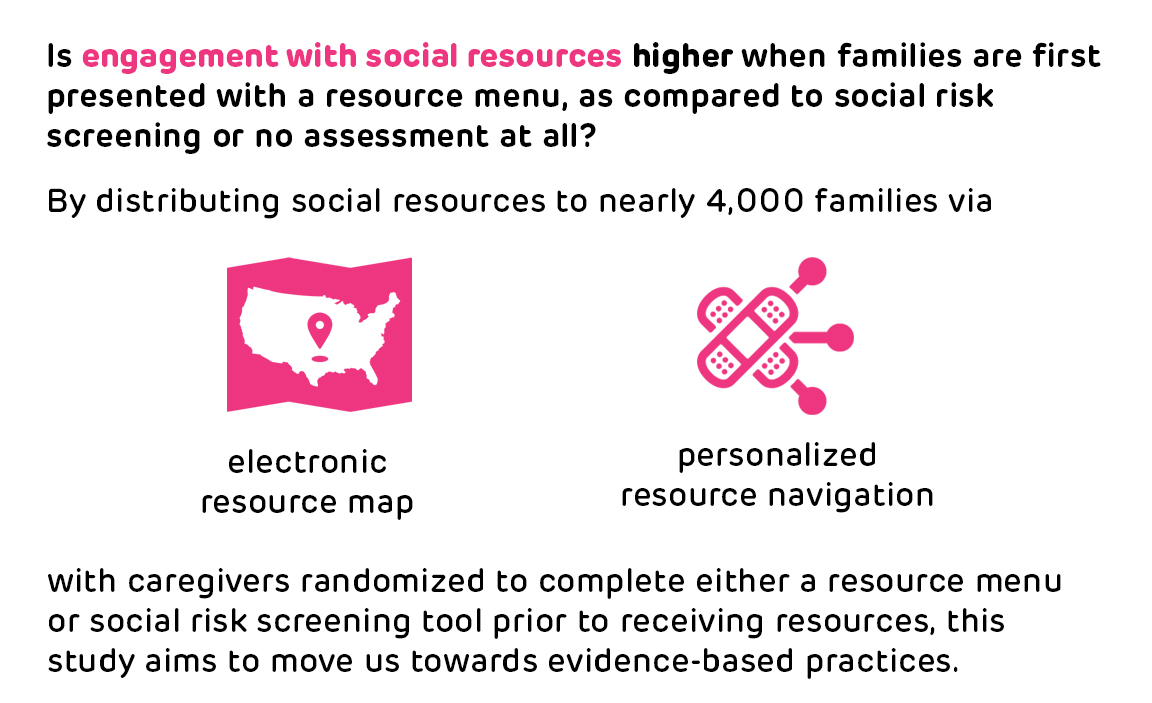Socially Equitable Care by Understanding Resource Engagement (SECURE): Leveraging Research to Ensure Equity
Statement of Problem
Economic hardships can significantly impede a child’s development, overall health and well-being, and ability to succeed in school and in life. The economic recession and racial disparities underscored by COVID-19 magnified this impact on children and hastened the already rapid growth of screening protocols for social risk factors—such as food and housing insecurity, financial strain and unsafe environments—within pediatric health care.
Although screening is generally the first step in social risk interventions, this may lead to inequality in the distribution and utilization of social resources through three major mechanisms: 1) discordance between screening results and desire for services; 2) discomfort with screening and fear of negative repercussions; and 3) racial biases in screening. Identifying an alternative to screening processes may help to improve connection with desired resources and in turn, decrease disparities in health and behavioral outcomes for children and families.
Resource menus, which are structured lists of resources from which caregivers can self-select the types of programs and services they are interested in without prerequisite disclosure of need, have emerged as a strengths-based approach to providing social resources. Early evidence suggests that resource menus could be an effective and less stigmatizing substitute for screening, but research on this approach has been limited.
Utilizing a mixed-method approach, our study answered the major research question: does offering social resources without preceding social risk screening improve acceptance, perception and engagement with social resources among families with children? Furthermore, by introducing resource mapping technology as the method of resource referral, this study provided insight regarding its effectiveness as a social needs assistance strategy. We also offered personalized resource navigation to all study participants and evaluated predictors to engagement with resource navigation.
Description
Socially Equitable Care by Understanding Resource Engagement (SECURE): Leveraging Research to Ensure Equity
Socially Equitable Care by Understanding Resource Engagement (SECURE): Leveraging Research to Ensure Equity


Eliminating screening processes may help reduce inequality in the distribution of social resources—resources that can, in turn, decrease disparities in health and behavioral outcomes for children.
Our study enrolled nearly 4,000 parents or caregivers of patients ages 0-21 years receiving care at Children’s Hospital of Philadelphia’s (CHOP) Emergency Department and two CHOP Primary Care practices.
We first conducted a multi-site randomized controlled trial comparing caregiver desire for and acceptance of resources introduced with or without a preceding resource menu or standardized social risk screening tool. Caregivers were randomized to one of three groups: the first and second groups completed a resource menu or standardized social risk screening tool, respectively, prior to receiving resources, while the third group received resources without completing a prior social assessment.
We found that significantly more caregivers who received the resource menu reported interest in social resources compared to the group that received the screener (38.4% vs 29.0%). These results demonstrate that the standard practice of using a caregiver’s response to a social risk screener as the criterion for providing resources may exclude a significant proportion of families who desire assistance.
Furthermore, we found that engagement in social care was predicted by caregiver reported desire for assistance and number of social domains (for example, food, housing, and transportation) in which caregivers desire assistance. These findings suggest a more feasible tiered structure of support in social care programming that eliminates the need for screening: electronic resources provided to all, tailored resource information and referrals for those requesting assistance, and individualized resource navigation for those who desire it. This “SECURE Protocol” enhances equity by centering caregiver autonomy to self-identify desired supports.
We also interviewed 60 caregivers to explore their views on the collection of social care data in the pediatric health care setting. Caregivers shared several main concerns:
-
Stigmatization by providers and medical staff and risk of child protective services involvement
-
Providers presuming connections between documented social needs or risks and medical complaints
-
Permanency of documented social needs/risks in the patient’s medical record
-
Visibility of social needs data by pediatric patients and other caregivers in the patient’s medical record
-
Fear that documented social needs or risks could negatively impact future insurance cost and coverage.
We also identified several factors that increase caregiver comfort with social care:
-
Clear communication regarding the purpose of social care data collection and use
-
Respect for caregiver autonomy, for example by providing the option to decline participation
-
Training of data collection personnel to ensure privacy and compassionate care
-
Consideration of timing within the medical visit, delaying assessment until medical concerns are addressed
Next Steps
While addressing social risk may be considered a moral imperative, this contribution moves the work toward evidence-based practice by carefully examining the comparative impact of social assessments. Furthermore, integrating these caregiver-identified factors into the implementation of future social care programs could increase caregiver comfort and equitable participation. We hope that the findings of this study will be directly applied to institutional and regional interventions that address social risk, and will inform adjustments to current policies and practices, such as replacing social risk screening with a resource menu approach.
We’ll build on the findings from this research in a new project, SECURE Implementation Trial (SECURE IT): Studying Implementation and Effectiveness of Social Care in the Emergency Department.
For more information on the SECURE project, click here.
This project page was last updated in September 2025.
Suggested Citation
Children's Hospital of Philadelphia, PolicyLab. Evaluating the Impact of Social Risk Screening on Uptake of Social Assistance: Leveraging Research to Ensure Equity [online]. Available at: http://www.policylab.chop.edu. [Accessed: plug in date accessed here].
